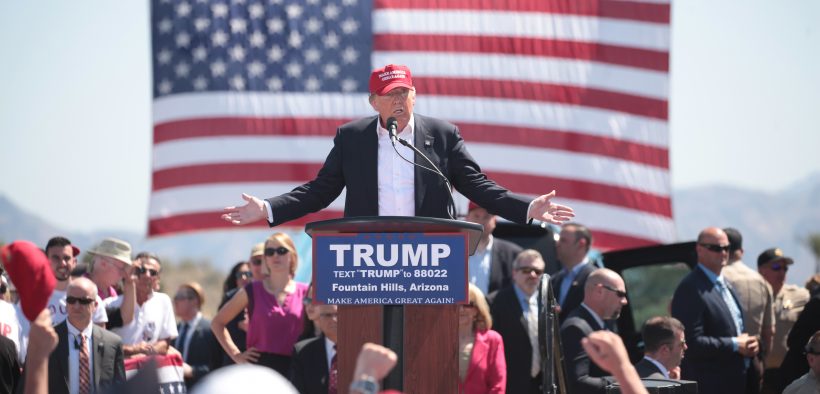Trump Won’t Rule Out Violating Ban on Foreign Contributions in 2020

“It is illegal for any person to solicit, accept, or receive anything of value from a foreign national in connection with a US election.”
(By Karl Evers-Hillstrom and Reid Champlin, Center For Responsive Politics) President Donald Trump created a firestorm Wednesday when he told ABC’s George Stephanopoulos he would consider accepting damaging information about his 2020 opponent from a foreign government.
“It’s not an interference, they have information — I think I’d take it,” Trump said. “If I thought there was something wrong, I’d go maybe to the FBI — if I thought there was something wrong.”
Trump doubled down on his statement Friday morning in an interview with Fox & Friends, saying he would report attempts from foreign actors to give the campaign information to the FBI — only after listening to what they had to say.
“Of course, you have to look at it, because if you don’t look at it you’re not going to know if it’s bad,” Trump said.
Trump’s interpretation of such a situation is at odds with federal election law, which bars campaigns from soliciting or accepting “anything of value” from foreign nationals or foreign governments. Valuable information, including opposition research, could be considered an in-kind contribution that would violate the ban on campaign contributions from foreign nationals. Accepting the information and corroborating it could provide the campaign with a thing of value.
FEC Chair Ellen Weintraub, the commission’s lone Democrat, released a statement Thursday reiterating that any acceptance of “foreign dirt” is a violation of federal election law.
“It is illegal for any person to solicit, accept, or receive anything of value from a foreign national in connection with a U.S. election,” Weintraub said. “This is not a novel concept. Electoral intervention from foreign governments has been considered unacceptable since the beginnings of our nation.”
Trump’s comments come on the heels of special counsel Robert Mueller’s report on Russian interference in the 2016 presidential election. In the 448-page report, Mueller dedicated an entire section to the infamous 2016 Trump Tower meeting between Trump campaign officials and actors of the Russian government purporting to offer damaging information about Hillary Clinton.
Mueller declined to charge Donald Trump Jr. for illegally soliciting a thing of value from a foreign national, saying he could not establish the value of the information being offered by Russian lawyer Natalia Veselnitskaya through a third party. The value of the information must surpass a $2,000 threshold for a criminal charge or $25,000 for a felony charge — Mueller concluded that Veselnitskaya ultimately did not deliver on her promise of providing damaging information.
Brendan Fischer, director of federal reform at the nonpartisan Campaign Legal Center, said the FEC could still pursue civil penalties against Trump Jr. because the agency does not have to prove that violations were committed willingly nor establish the value of the opposition research.
Trump’s comments drew a wide range of reactions from lawmakers, with 2020 Democrats quickly pouncing.
Former vice president and current presidential frontrunner Joe Biden took to Twitter Wednesday saying, “An American President should not seek [foreign] aid and abet those who seek to undermine democracy.”
Rep. Eric Swalwell (D-Calif.), another presidential hopeful, published an op-ed in The Atlantic saying impeachment should be pursued. Swalwell’s support now means that the majority of Democrats on the House Judiciary Committee are in favor of launching proceedings.
A number of Republicans also criticized the president’s statements, with Sen. Joni Ernst (R-Iowa) rejecting Trump’s comment that all politicians accept information from foreign actors.
“No, we don’t. Let’s stop there. No we don’t.”
Sen. Mitt Romney (R-Utah) said it would “be wrong and unthinkable that any candidate for president would accept such information” that might influence an election from foreign sources.
Sen. Lindsey Graham (R-S.C.) said he privately told the president to reach out to the FBI if a foreign source is offering something “you think is inappropriate”. Along with Reps. Kevin McCarthy (R-Calif.) and Jim Jordan (R-Ohio), Graham also compared Trump’s hypothetical to the Clinton campaign’s hiring of Fusion GPS, a Washington, D.C., firm which retained the services of former British MI6 operative Christopher Steele.
Jordan sent out a tweet Wednesday, saying, “Talk about taking foreign help. Hillary Clinton hired a foreign spy. He talked to Russians and put together an oppo research document.”
While accepting an-kind contribution from a foreign entity is prohibited, paying a company at market rates for opposition research services — even one that works with foreign nationals — is legal under federal election law.















